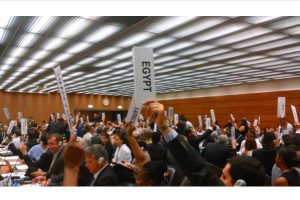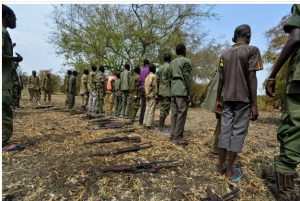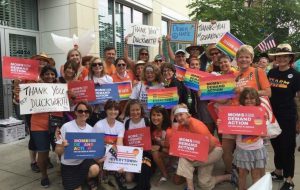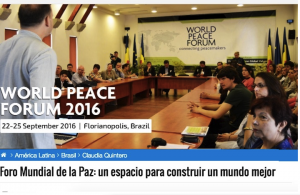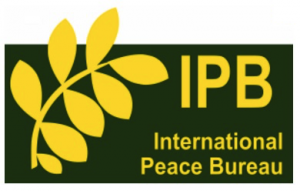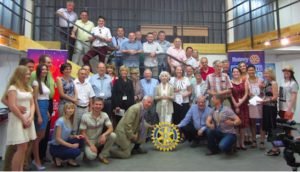DISARMAMENT & SECURITY .
An article and video from Democracy Now
Peace activist Kathy Kelly is about to begin a three-month prison sentence for protesting the U.S. drone war at a military base in Missouri earlier this year. Kelly, along with another activist, was arrested after offering bread and an indictment against drone warfare. Kelly is the co-coordinator of Voices for Creative Nonviolence, a campaign to end U.S. military and economic warfare.
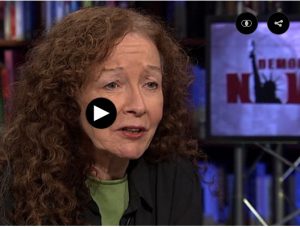
Video of interview with Kathy Kelly
TRANSCRIPT – This is a rush transcript. Copy may not be in its final form.
AMY GOODMAN: Kathy Kelly, in addition to U.S. troops staying, 11,000 troops staying, and participating not only in Operation Resolute Support, but fighting themselves directly, they’ll be supported by bombers, drones. You participated in a drone strike, and you’re headed home to Chicago, then to prison. Talk about this drone strike and why you chose to get arrested.
KATHY KELLY: Well, I think it’s a good time to be very uncompromising with regard to the United States’ wars. These wars are murderous. The wars are killing civilians, as has been happening in the United States’ wars since World War II. Now 90 percent of the people killed in wars are civilians. And this is true certainly with the drone strikes. The Reprieve organization has said that for every one person who is selected as a target for assassination, 28 civilians are killed. And even just three nights ago, there was another targeted assassination in which they hit two homes in the Logar province, and six people were wounded, four people were killed, all of them civilians.
And so, I crossed a line at Whiteman Air Force Base. A squadron operates weaponized drones over Afghanistan. Afghanistan has been an epicenter of drone warfare. And a good symbol for people in Afghanistan is breaking bread. I carried a loaf of bread and a letter, wanting to talk to the commandant. We thought it was important to know how many people were killed by Whiteman Air Force Base on that day.
AMY GOODMAN: Where is Whiteman?
KATHY KELLY: That’s in Knob Noster, Missouri.
AMY GOODMAN: And what’s its relationship with Afghanistan?
(Article continued in right column)
Drones (unmanned bombers), Should they be outlawed?
(Article continued from left column)
KATHY KELLY: Well, the weaponized drones are flown—once they’re airborne, they’re operated entirely by people in United States Air National Guard bases and air bases. And so, Whiteman Air Force Base won’t disclose, neither will the CIA disclose, information about the results of these killings, but this is what people in the United States need to know. We have a First Amendment right to seek redress of grievance. And having been in Afghanistan, living with young people who are too frightened to go back to visit their own relatives, who see for themselves a future that could be a prolonged, exacerbated warfare, there is a grievance, and we wanted to bring that to the commandant at that particular base.
AMY GOODMAN: I said you participated in a strike; I meant to say in a drone protest. So, exactly what was the action you engaged in?
KATHY KELLY: Well, I think I stepped one or two steps over a line. And—
AMY GOODMAN: Holding a loaf of bread and an indictment?
KATHY KELLY: And so the military prosecutor said, “Your Honor, Ms. Kelly is in grave need, great need, of rehabilitation.” But I think it’s a—this is an important time to connect these oppressive issues. You know, while we’re spending $1 trillion on warfare in Afghanistan and looking at another $120 billion that will be spent—the Pentagon wants $57 billion for this year alone—we’re squandering needed resources. We’re undermining the possibility of solving extremely serious problems that we’re moving into.
AMY GOODMAN: How long will you be going to prison for?
KATHY KELLY: Three months.
AMY GOODMAN: Where?
KATHY KELLY: Well, I don’t know yet. The Bureau of Prisons will tell me where I’m to be put, probably at the end of January.
AMY GOODMAN: How many times have you gone to prison for protesting war?
KATHY KELLY: Well, this will be my third time in a federal—well, no, fourth time in a federal prison. And I’ve been jailed in various county jails and other kinds of lockups more times than I can count.
AMY GOODMAN: Kathy Kelly, I want to thank you very much for being with us—
KATHY KELLY: Thank you, Amy.
AMY GOODMAN: —co-coordinator of Voices for Creative Nonviolence, a campaign to end U.S. military and economic warfare, just returned from Kabul, Afghanistan. We’ll link your recent piece, “Obama Extends War in Afghanistan: The implications for U.S. democracy aren’t reassuring.” And, Matt Aikins, please stay with us. I want to talk about your latest piece looking at Afghanistan; the piece is “Afghanistan: The Making of a Narco State.” Stay with us.
